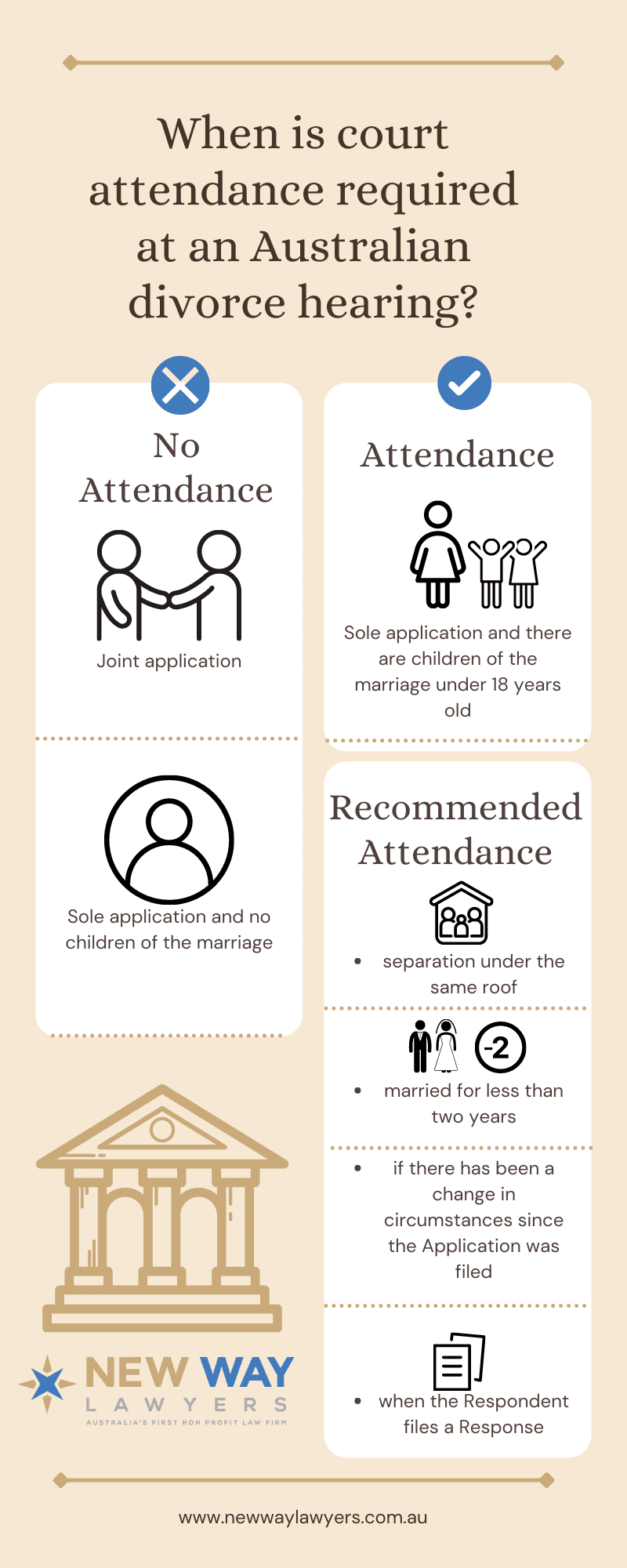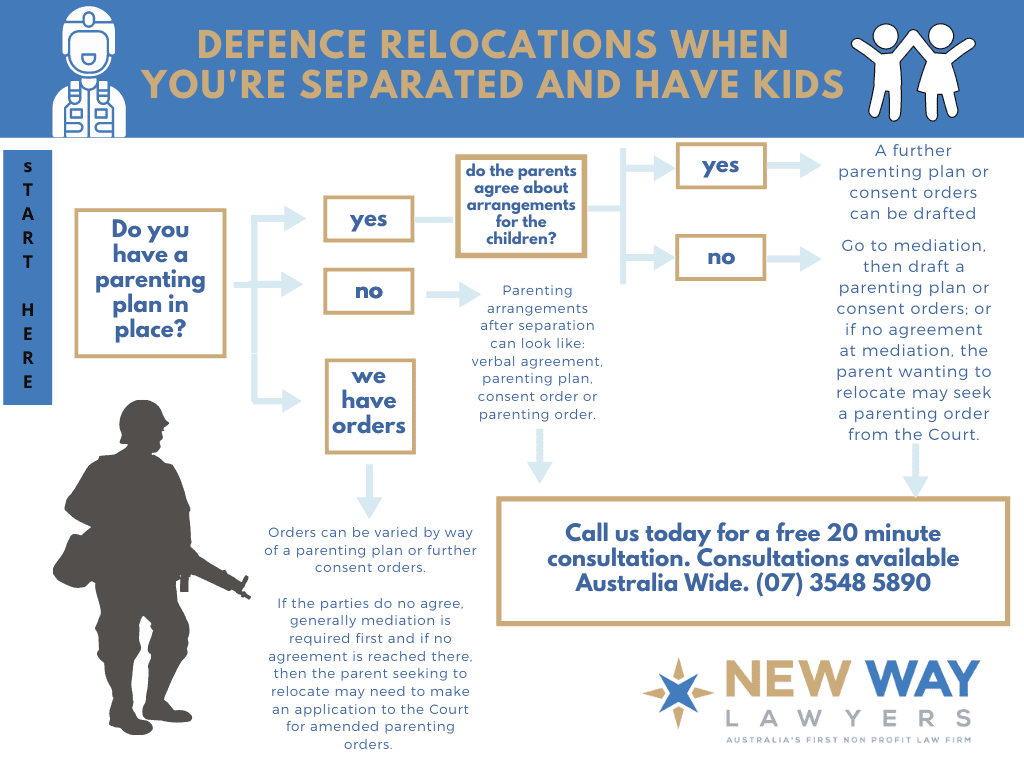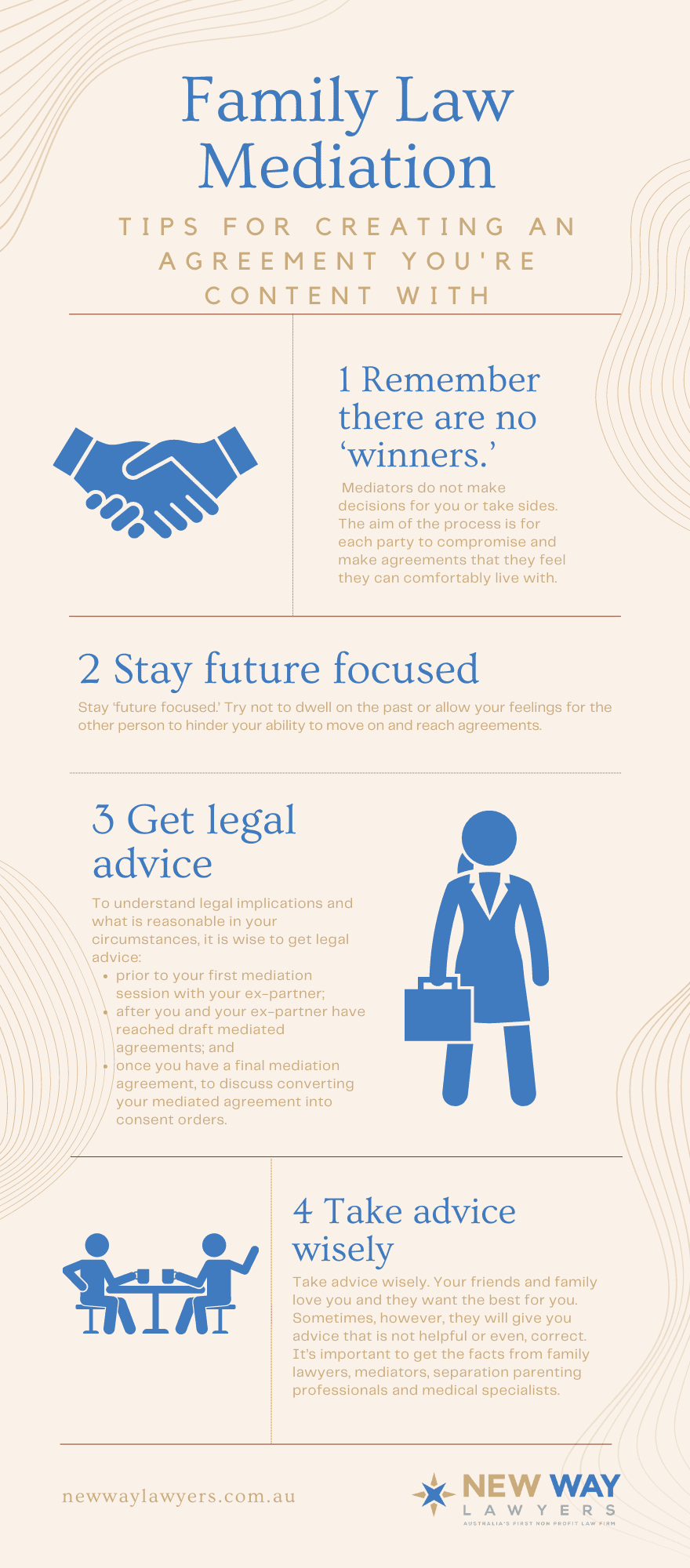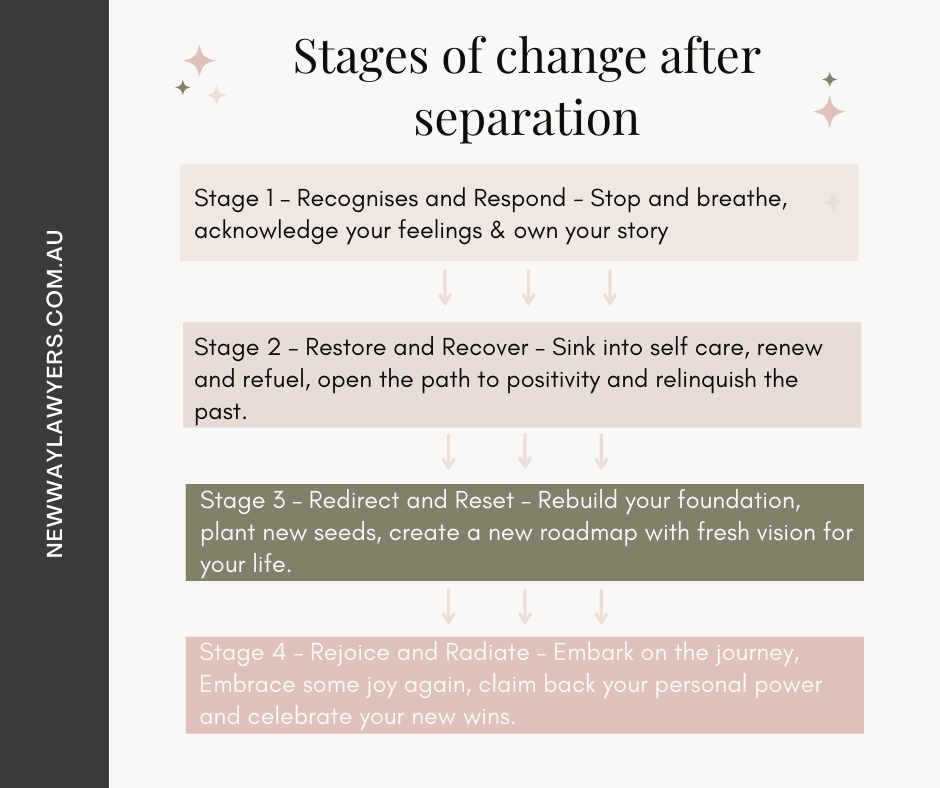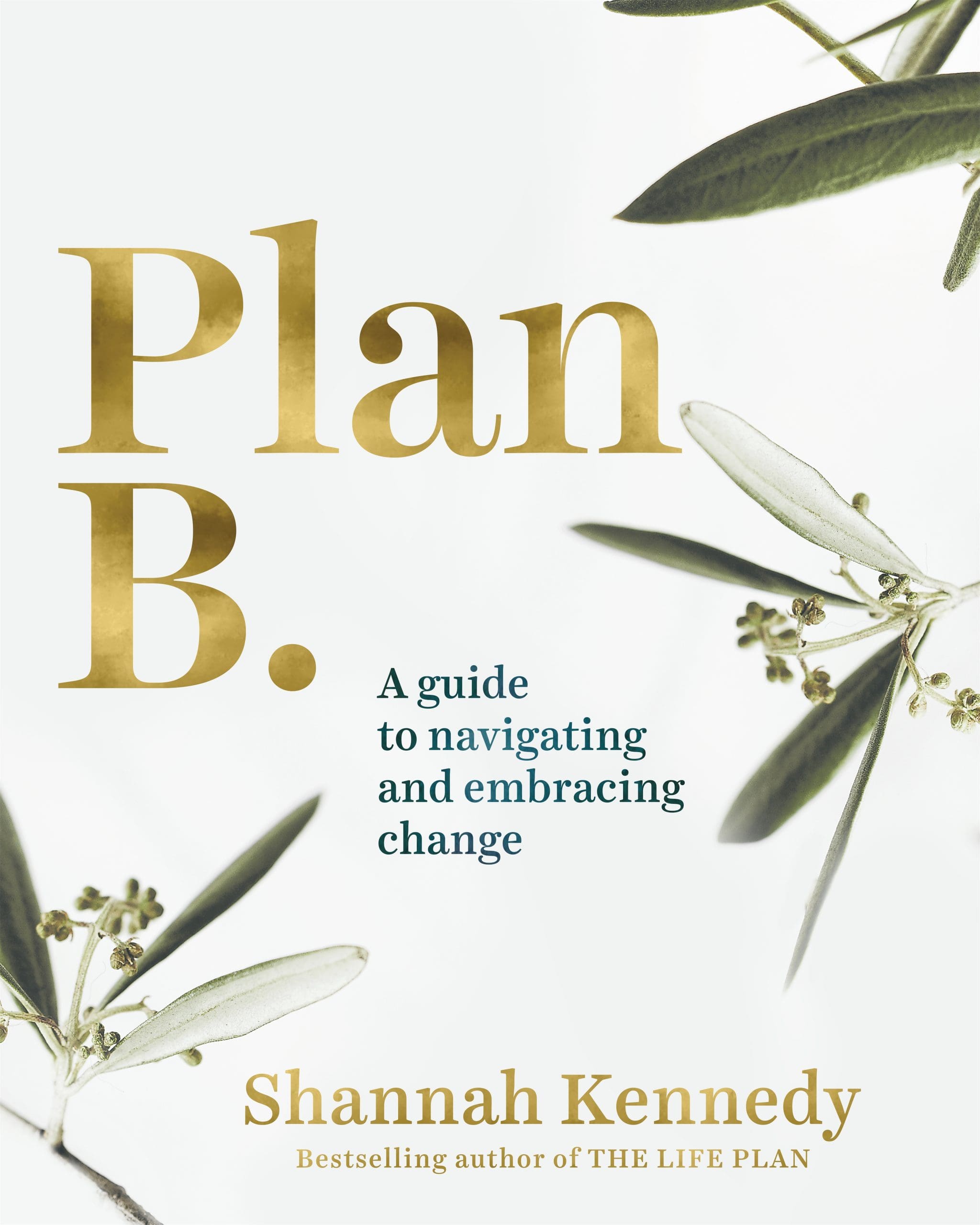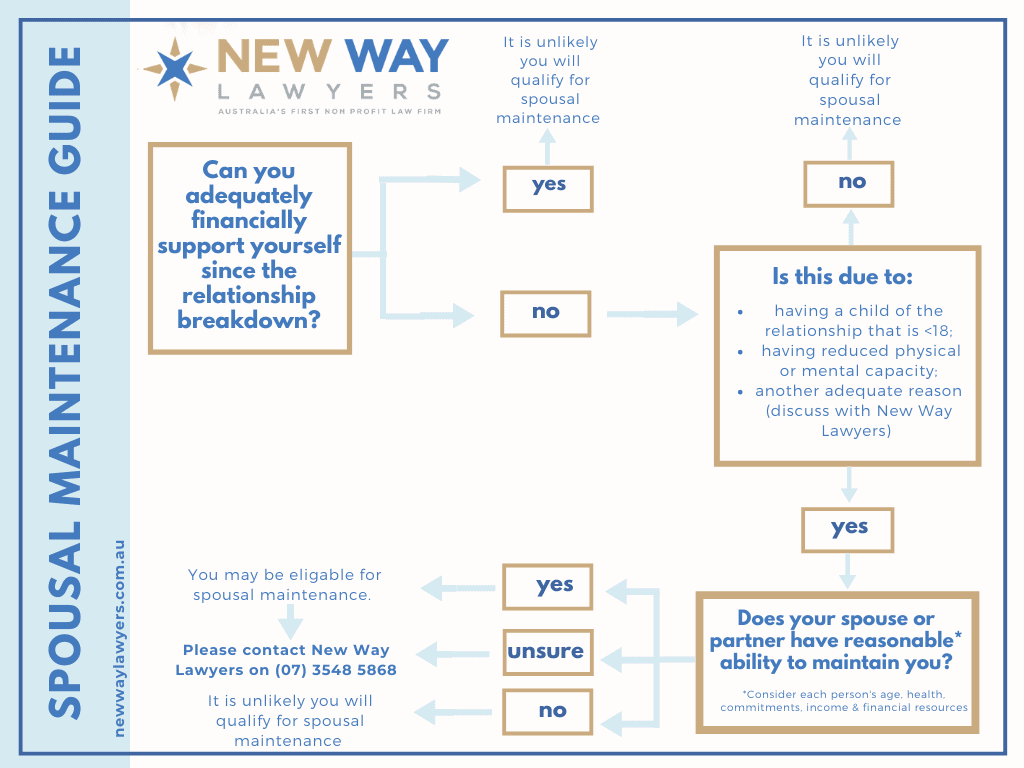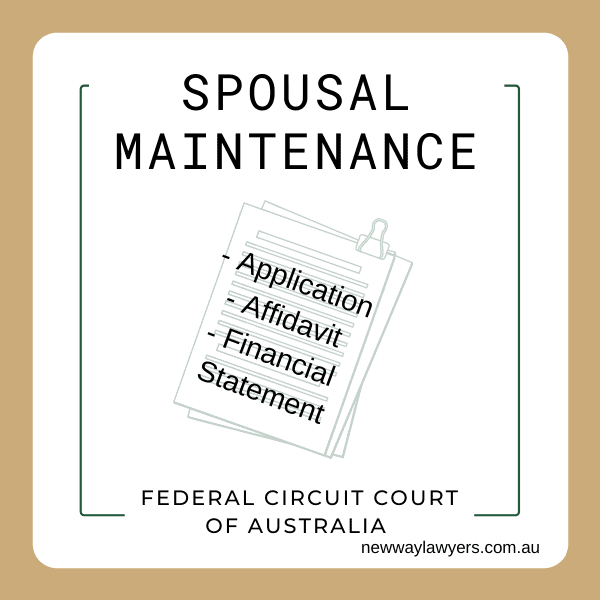-
All You Need to Know About Separation and Divorce
October 19th, 2022 | by newwaylawyersSeparation and Divorce – preparing for the unpreparable
Separation and divorce is never easy. Regardless of the reasons behind a separation, the emotional journey can be difficult and the legalities around separation and divorce can feel overwhelming.
To help you out: Here’s our guide to preparing for the unpreparable.
Divorce vs Separation
What is the difference between separation and divorce?
The term divorce refers to the formal cessation of a marriage by submitting an application to the Federal Circuit and Family Court of Australia. Once the Federal and Family Court of Australia approve an application for divorce, all legal connections between formerly married parties’ are terminated.
Separation, unlike divorce, is the ending of a relationship that was never legally recognised. Depending on the nature and length of your relationship, even a separation can have legal consequences.
Why are separation and divorce so painful?
This might be an obvious question, but the answer is multi-dimensional and layered. Of course, there is inherent emotional pain involved in either a separation or divorce. Following the breakdown of a relationship, it is normal to experience feelings of grief, anger, sadness and denial. There is also usually a great deal of change in terms of living, parenting and financial arrangements.
When it comes to separating financial assets, financial loss and change can have significant impacts. Changing from a two-income household to a single income, for example, can impact day-to-day living arrangements and choices.
Individuals going through divorce and/or separation can experience a variety of feelings and for that reason, it is important to be kind to yourself, seek information from qualified professionals and emotional support.
Possible reasons for separation or divorce
Every separation is different and unique and is often caused by multiple factors. Nonetheless, the possible reasons for divorce and separation include:
- Erosion of commitment and love over time.
- Lack of communication or increase in conflict and arguments.
- Infidelity or extramarital affairs.
- Lack of intimacy.
- Domestic violence or abuse (emotional, verbal, physical or financial).
- Money or financial problems.
- Addictions.
The Emotional Stages of the Divorce
Following a separation or divorce, there are said to be at least five stages of grief. These stages begin with Denial.
Denial
Unlike prevalent misconceptions, denial isn’t about refusing to accept reality or acknowledge the truth. During separation or divorce, one or both parties can simply find it too difficult to process or emotionally accept the experience. There are a lot of considerations and emotions which can cause a person to be in denial and not fully accept the separation is taking place.
Anger
If a person moves through the phase of denial, it is common for that person to begin to experience feelings of anger. Especially in instances of infidelity or other associated breaches of trust in the relationship, it is common for there to be feelings of anger.
Bargaining
During a separation or divorce, it is normal to have times of feeling hopeless or vulnerable. Such intense emotions can motivate our minds to want to regain control or determine the outcome of the situation. In these circumstances, a person may start to think statements like; ‘what if…’ or ‘if only…’ in attempts to find solutions and gain control of the situation.
Depression and Acceptance
The final two stages occur after the more active stages of anger and bargaining. Depression can feel like a more quiet stage of the grieving process. Depression can be the result of the deep sadness experienced during the separation or loss. Moving through this stage will result in acceptance. While it may not mean that the person is happy or at peace with the separation or divorce, it may simply mean that the person has come to accept that it has happened and begin to make sense of what it means for their life now.
Tips For Coping With Divorce And Separation
Give yourself a break
Whether experiencing a separation or divorce, despite the reasons behind it, separation or divorce is a difficult time.It is important to give yourself a break and allow yourself the emotional space to experience your feelings. Don’t expect a quick recovery or to simply shrug off the experience. Accept your feelings and understand that it is normal to have them.
Take time to explore
Change is scary. That’s why it’s vital that you give yourself time to explore options and think about your new life. Don’t rush into decisions or hold yourself back from adjusting your life in a way that will help you be happier and healthier in the long run.
Love and validate yourself
Practising self-love and validation may not sound like everyone’s cup of tea, but it’s actually really important. Self-esteem and confidence can be significantly impacted during the process of divorce & separation, so giving yourself the tender self-love and care you deserve is vital.
Don’t blame yourself or the relationship
When things go wrong, it’s tempting to start ascribing blame. But this is never helpful. Resist the urge to blame yourself or the relationship. It can be easy to look back and taint your entire experience with your former partner. But such a habit can also be detrimental to your ability to move forwards and forge new relationships.
Move forward and be positive
Being positive might sound simple but it’s never easy. While the legalities involved in separation vs divorce in Australia are different, it doesn’t mean one is any easier to move forwards from than the other. But by giving yourself permission to move forward without guilt or shame and being positive about the future ahead, you just might find yourself feeling and living a little better.
Embrace the change
Embracing change is more natural to some than to others. Nevertheless, it’s important to understand that accepting change does not reduce its difficulty or the immensity. Embracing the change, warts and all, will however make everything just a fraction easier.
Talk to the expert
If you need emotional or general life support, make sure you turn to the experts. Professional counsellors and psychologists are trained to help guide clients through the trials of separation and divorce. From a legal standpoint, having the backing of expert legal advisors will ensure your financial and parenting issues are taken care of as well.
Things To Consider When You Are Separated From Your Partner
Parenting Arrangements
Parenting arrangements are important to consider when finalising a separation or divorce. Talk with your lawyer about how you parenting arrangements can be managed.
Wills & Powers of Attorney
Putting your wills and power of attorney in order after a divorce or separation is really important to ensure your estate is dealt with in the way you wish it to be after your death.
Depletion of Assets
Similarly, without proper legal specification regarding the depletion of your assets you cannot be confident that your estate will be handled in line with your wishes.
Safety and Concerns
While not always relevant, if you have genuine concerns about your or your family’s well being and safety, make sure that you work and communicate with support services who can assist.
A New Way forward after divorce and separation starts here…
New Way Lawyers is a not-for-profit law firm. Our industry-leading legal experts put their minds, hearts and work into ensuring the best quality legal advice is possible at a price point that is accessible for all.
If you’re going through divorce or separation, feel free to reach out to the New Way team today for advice, assistance and support.
-
How to support children during & after separation
June 23rd, 2022 | by newwaylawyersBy Karyna Jansons, Owner of Ceres Counselling
Separation and divorce usually mean monumental changes for family life. If you have children and are separating, it’s normal to worry about how your children are going to adjust to this new way of living and it’s also normal for children to have a difficult time adjusting. But don’t worry, there are many tools available to you to help ensure your children have the best support while undergoing these family changes.
Here are some helpful tips and tricks to help you support your children (and yourself!) during these challenging times.
- Openly and honestly communicate with your children about what’s going on in a language appropriate for their age-level. While this doesn’t mean you tell them all the nitty gritty details, engaging them in honest conversation about what’s happening and giving them the opportunity to discuss how they feel about the situation can help your child feel included, loved and cared for. Children will often have ever-evolving questions about the changing dynamics, and making time and space for private conversation with them can help alleviate some of their anxiety. When talking about these matters, make sure you’re aware of your body language and try and stay as calm as possible.
Helpful tip: Do not bad-mouth your ex-partner in front of your children, no matter how you might feel about them or what has happened. This can create anxiety and sadness in children, and even feelings of guilt, shame or confusion about their natural love for a parent. Children need to be given agency to decide how they feel about a situation or about a parent’s behaviour.
- Be sensitive to your children’s emotions. Separation is tough on everyone, but it can be especially tough on kids. For young children, separation can be a crash-course in emotions they haven’t experienced yet, such as anger, guilt, shame, fear or loneliness. Put a teenager in the mix combined with their changing bodies, hormones and individual identity development and you’ve got a recipe for tumultuous times. Allow your children to feel and express their emotions and validate what they are feeling. If they choose to reach out to you, make sure you give them your full attention and let them know you understand how hard it is.
- Stick to a good routine and blend new and old rituals. Separation can bring a change of routines and challenges around foundational aspects of your child’s life, such as moving to new locations, co-parenting or navigating two separate schedules. This can be disorienting and anxiety-inducing for children as they crave security. If you are able to have positive parenting conversations with your ex-partner, agree on schedules and routines that help the children, such as the same bedtimes and school drop-off/pick-up routines. It may also be helpful to continue engaging in old rituals, such as Sunday roasts or Saturday morning walks to provide some continuity. Allow the kids to put in their ideas for new rituals as well. Spending quality time with the children before bed every night, such as reading a story or waking them up in the same manner every morning can also help them feel safe and secure.
- Strengthen your children’s support networks. Separation can feel like an isolating time for kids, so it’s important they have strong social support outside of you and your ex-partner. Keep them regularly in contact with friends, extended and supportive family or community networks (such as schools, sports or youth groups). This allows them the opportunity to voice their feelings to others if they need to. While you may want your children to talk to you about everything, there will always be some things they feel they can only voice to friends or other trusted confidants. If you really feel like your children are struggling badly, counselling can help but your child needs to be on board with you seeking out additional support for them.
- Look after yourself! Make sure you take enough time-out for you as well. If you’re struggling, it’s likely to make things more difficult for your children if you’re not coping well. While some ups and downs are normal during this difficult time, you don’t want to burn out. Get enough rest, sleep and down-time. Rely on your own support network, and seek professional assistance if you’re really struggling to cope. Remember that while smooth seas never make a skilled sailor, it’s not helpful to try and chart a course on your own during a major storm. Take time for you, and put yourself first every once in a while.
About Karyna Jansons:
Karyna Jansons is the owner of Ceres Counselling, a warm, non-judgemental and deeply compassionate counselling service for clients who want to be seen for their wholeness and not just a label or diagnosis. Having lived and worked remotely in the NT for nearly 20 years, she is now based in Queensland where she provides online and phone counselling to anyone across Australia. She has previously worked with women and children escaping domestic violence, youth involved in the justice system and adults with severe mental health concerns. She is passionate about making counselling accessible to everyone and is passionate about breaking the stigma that surrounds mental health.
- Openly and honestly communicate with your children about what’s going on in a language appropriate for their age-level. While this doesn’t mean you tell them all the nitty gritty details, engaging them in honest conversation about what’s happening and giving them the opportunity to discuss how they feel about the situation can help your child feel included, loved and cared for. Children will often have ever-evolving questions about the changing dynamics, and making time and space for private conversation with them can help alleviate some of their anxiety. When talking about these matters, make sure you’re aware of your body language and try and stay as calm as possible.
-
Parenting Plans: What you need to know
March 28th, 2022 | by newwaylawyersAre you wondering what issues can be included in a parenting plan or how you and your ex-partner can create one? Maybe you’re wondering what a parenting plan actually is? Well, you have come to the right place as we are going to explain what a parenting plan is, what parenting issues can be included in your plan and how you can draft it.
What is a Parenting Plan?
A parenting plan is a written agreement, recognised under the Family Law Act, that sets out the parenting arrangements and responsibilities for one or more children. Both parents or guardians are to work out the arrangements and agree to the plan before dating and signing it.
How can separated parents or guardians create a parenting plan?
There is no specific or required format for a parenting plan. If you and the other parent or guardian are able to agree on the parenting arrangements and responsibilities for the child/ren, you can simply document your agreement and date and sign it.
Services are available to assist you and the other parent or guardian reach agreement through family dispute resolution (FDR). FDR is a process that brings two parties’ together to discuss issues in conflict. A mediator trained in family dispute resolution, works with both parties to reach agreements and work through conflict. Agreed outcomes can be documented into a parenting plan following FDR.
For information as to which services can provide FDR, visit: https://www.familyrelationships.gov.au/talk-someone/centres
Do I need a family lawyer to make a parenting plan?
There is no requirement for a family lawyer to be involved with the making of a parenting plan – parents and guardians can proceed with the assistance of a family lawyer. At any point during the process of arranging a parenting plan a parent or guardian can however engage a family lawyer for advice or assistance if questions or concerns arise.
What issues can be included in a parenting plan?
A parenting plan can include everything concerning the parenting arrangements and responsibilities for your child or children including;
- Allocation or parental responsibility
- Living arrangements and time arrangements for the children with each parent;
- Communication by way of telephone, face-time and/or online time with each parent when not in their care;
- Schools and/or Day care centre’s both parents or guardians agree their children will attend;
- Agreed parenting rules or strategies to be enforced in each house such as not playing video games after 8pm, not having a mobile phone until a certain age, not having ears pierced or hair dyed until both parents agree and so on.
- Financial support arrangements for the children
What should parents or guardians consider when making a parenting plan?
- Children’s best interests are to be prioritised when making long term decisions about the child/ren or day-to-day care and responsibility of the child/ren;
- Children’s wishes and views;
- The age, stage and development of the child/ren;
- Special needs of the child/ren including any medical, learning, developmental and/or psychological needs;
- Education and educational needs of the child/ren;
- Cultural needs of the child/ren;
- Safety needs of the child/ren;
- Practical planning considerations regarding the transport, living arrangements and expenses for the child/ren;
- Suggestions and recommendations from child development professionals;
- Financial responsibilities of each parent that are outside the scope of child support such as extra-curricular activities, additional uniforms and medical treatments involving out of pocket expenses such as dental, orthodontic and optical.
- Strategies for minimising and resolving conflict that may occur between the separated parents or guardians to the plan.
Is a Parenting Plan legally binding?
A parenting plan is not legally binding.
Can I make our Parenting Plan legally binding?
If you would like to make a parenting plan legally binding, you can apply for consent orders which means both parties agree and consent to parenting orders being made.
If you and the other parent or guardian do not agree and want to make an application for parenting orders to the Family Court and Federal Magistrates Court of Australia (FCFCOA), you need to attend Family Dispute Resolution (FDR) prior to making an application with the Court.
For more information on parenting orders and how to apply, visit: https://www.fcfcoa.gov.au/hdi/apply-parenting-orders
If you have further questions about a parenting plan one of our family lawyers would be more than happy to have a free 20 minute phone consultation with you. Simply fill in an online enquiry form and one of our family lawyers will arrange to give you a call.
-
Experiencing anxiety and grief during the festive season
December 14th, 2021 | by newwaylawyersChristmas is a happy time of year but for families experiencing family law issues, it can be lonely, stressful and confusing. Financial strain, navigating parenting arrangements and adjusting to a new way of living can make it difficult. It is not uncommon to experience anxiety and grief during the festive season and it is important to know you are not alone.

With many services closing over the Christmas and New Year period, it is hard to know where support is available. It is important, however, to reach out for support so we have compiled a a list of services offering support during December and January;
- eheadspace.org.au (6am-10pm Perth Time) – non-crisis service
- Lifeline (5pm-2am Perth Time) – https://www.lifeline.org.au/crisis-chat/
- Kids Helpline (for 12-25 year olds) – http://kidshelpline.com.au/teens/get-help/webchat
- Q-Life online and phone counselling for LGBTI+ people: https://qlife.org.au/
- Sexual assault, domestic and family violence phone counselling: 1800 RESPECT (1800 737 732) – available 24/7
- Mates in Construction – for those working in the construction and building industry: 1300 642 111 – available 24/7
- Family Drug Support line – for families affected by drug and alcohol use: 1300 368 186 – available 24/7
-
How to get a Divorce in Australia
October 25th, 2021 | by newwaylawyersThe concept of ‘no-fault divorce’ in Australia
With the establishment of the Family Law Act 1975, the concept of no-fault divorce was introduced for the first time in Australia. It is no longer necessary to show wrongdoing on the part of one party to the marriage and the Court is no longer concerned with the reasons for the breakdown of a marriage. The only criteria necessary for a valid application for divorce is for parties to establish that there has been an irretrievable breakdown of marriage, evidenced by a twelve-month separation preceding the filing of an Application for Divorce.
Benefits of the no-fault divorce concept
This concept was introduced to reduce conflict and minimise hostility between the parties, to simplify the process and to make divorce more cost effective for parties’.
Fault elements such as domestic violence may still be important when it comes to parenting arrangements.
How to file an application for Divorce in Australia
Along with a whole host of changes arising from the COVID-19 pandemic, all applications for divorce can now only be filed electronically.
An application for divorce can be a sole application or a joint application.
Service of the Application for Divorce
In a sole application for divorce, the Applicant must serve the Respondent with the application for divorce and supporting documents. The Court must be satisfied that the Respondent is aware of the application and has had an opportunity to respond to the application. If the Respondent resides in Australia, the Respondent must be served all documents at least 28 days before the hearing day. If the respondent does not reside in Australia, the Respondent must be served the documents at least 42 days before the hearing.
Ground to oppose a Divorce
There are very limited grounds to oppose a divorce. Given that the basis for a divorce is the irretrievable breakdown of marriage, the only way to oppose an application for divorce is to establish that the marriage has not broken down. You must prove either that you have not yet been separated for twelve months or that there is a chance you will get back together.

Separation Under One Roof
If you have been separated but living under the same roof, which is often due to financial reasons, you will need to prove to the court that the separation is genuine and that it has been for at least 12 months. In this case, you will have to provide extra information to the Court as proof of the separation.
Children
If there are children of the marriage who are under the age of 18 years, the court will only make an order for divorce once satisfied that proper arrangements have been made for the care and welfare of the children. These arrangements do not have to be formalised pursuant to a parenting plan or parenting orders. The arrangements can be pursuant to an informal arrangement.

Attendance at Divorce Hearing
- For a joint application – attendance is not required;
- For a sole application if there are no children of the marriage – attendance is not required;
- For a sole application if there are children of the marriage under the ages of 18 years – attendance is required.
In the following circumstances, attendance is recommended:
- separation under the same roof
- married for less than two years, or
- if there has been a change in circumstances since the Application was filed
- when the Respondent files a Response
When will the divorce order take effect?
A divorce order becomes final and takes effect one month and one day after the date the Order is made.
-
Defence posting relocations, separation and child custody arrangements
October 8th, 2021 | by newwaylawyersPosting relocations are difficult for Australian Defence families at the best of times, but even more so when the move occurs following separation and there are parenting arrangements to consider. Emotions are often intensified and feelings of uncertainty can arise for children and parents alike. Our experienced family lawyers have helped many Defence families with questions about family law and posting relocations. Set out below is some general information that may be helpful to families who find themselves in this situation.
For those newly separated in the Australian Army, Navy or Air Force
there are four approaches parents can take to parenting arrangements after separation. These are a verbal agreement, parenting plan, consent order or parenting order. To determine which might be best for you, take this simple quiz.
Is there separate rules for those in defence?
There are no separate rules for parenting arrangements when it comes to Australian defence relocation or deployment matters. The relevant objects and principles set out in the Family Law Act 1975 (Cth) guide the court, with the child’s best interests as the primary consideration.
What sort of orders can the court make?
The court has the ability to make broad orders including permitting a child to locate ‘wherever’ the parent in question was posted by the ADF, so long as this was in Australia. Two relevant recent cases on this matter are Wendland & Wendland [2017] FamCAFC 244 and Osmond & Brand [2019] FCCA 1696.

For those with a parenting plan in place
If you and your ex spouse or partner already have a parenting plan in place and there is no urgency involved, then the process can involve:
-
If the parties agree to the move
When both parents agree to the child/ren relocating with the defence member, a further parenting plan or consent orders can be drafted. The things that should be considered in a parenting arrangement can be found here.

-
If the other parent doesn’t agree to the move
When there is disagreement between the parents regarding the relocation of the child/ren, then generally mediation is compulsory (there are however some limited exceptions to the requirement for mediation). If an agreement is reached at mediation, then a parenting plan or consent orders can be drafted thereafter. If an agreement is not reached, the parent wanting to relocate may at that point need to seek a parenting order from the Court.
For those with court orders
When there are existing court orders, the parties will need to vary the orders to accommodate the new situation. This can be done by way of a parenting plan or further consent orders if the parties are in full agreement about the new arrangements. .
If the parties have existing orders but they do not agree on the move, then they will generally have to attend mediation first before going to court to seek variation of the orders. If there is no agreement reached at mediation, the parent seeking to relocate may need to make an application to the Court for amended parenting orders. The application would however have to satisfy the Rice v Asplund test. This threshold test is explained here.
Considerations that are relevant to parenting arrangements in Defence relocation / posting matters
It is well established that the best interests of the child include the minimisation of future proceedings and litigation. In light of this, the Court will try to ensure any further orders address the issue of future deployments, even if the details of future postings are unknown at the time the orders are being made.
In light of this, the court may consider whether one parent should have sole parental responsibility rather than an equal shared parental responsibility. The court might also consider whether orders should be made with two alternatives included, one allowing for arrangements that apply when the parents live in close proximity and the other for when the parents are living a long distance apart due to deployment or relocation.
Get expert family law advice early

Defence relocations are complex in nature and the considerations involved in these cases are varied and specific to each family. We highly recommend getting legal advice from expert family lawyers if you or your ex partner/spouse are relocating due to a posting order with the Australian Army, Air Force or Navy.
If you would like to discuss your options or the particulars of your case, phone New Way Lawyers on 1300 043 984 or contact us here for a free 20 minute consultation with one of our expert family lawyers. Australia wide consultations are available.
-
-
Partner Support when separating from an Australian Defence Force Member
September 27th, 2021 | by newwaylawyersIf you are separating from an Australian Defence Force (ADF) member there are avenues of support available from Defence, as you transition out of being a Defence family. Sometimes it can be hard to know what support is available if you are not familiar with ADF policy documents or if your ex partner/spouse has not shared this information with you. Our firm is experienced in Defence family separations and can help you understand the support available if you are an ex-defence partner.
You must be recognised as a dependent for the benefits to apply
Defence support for partners after separating from an Australian Defence Force Member only applies if you are recognised as a dependent. If this is the case, your partner will need to follow these guidelines and advise Defence that the relationship has ended.
If your partner is unwilling to do this you can speak with Defence Families of Australia, Defence Member Family and Support (DMFS) Branch (formally Defence Community Organisation), or a Chaplain to assist with this process.
Living in Defence Housing Australia Service Residences after Separation

Once Defence has been notified of the relationship breakdown and the member has received the recategorisation notice, the ADF member must notify DHA. Defence then gives you 28 days to vacate the property. The member can request an extension if there are children of the relationship and the member will spending time with them.. This request is considered and approved by a senior manager at Toll Transitions.
Moving costs when separating from an Australian defence force member

The Defence Pay and Conditions Manual (PACMAN), outlines in Chapter 6.5 the support to a non-serving member upon separation. Specifically it outlines the situations where a spouse or partner is entitled to moving and associated travel costs. Further information regarding partner assistance following a relationship or marriage breakdown can be found in Chapter 8.11
Toll Transitions will guide the partner through these policies directly and they can be contacted on 1800 819 167.
Open Arms

Open Arms offer free and confidential counselling for veterans and their families. This includes children and ex spouses or ex partners of a serving member where they are co-parenting a child under 18 years of age, or it is within 5 years of the relationship ending.
Open Arms offers a free 24 hour support service that can be accessed by calling 1800 011 046.
Family Law legal advice

Family Law covers topics such as separation, divorce, property settlement, arrangements for children, and domestic and family violence. If you need further guidance on these matters as you journey through separation, we are here to offer our expert family law knowledge in a compassionate and caring way. New Way Lawyer’s has experience representing military personnel and partners of serving members.
What about kids and ADF postings after separation?
 If you need assistance during separating from an ADF member, or you are an ADF member yourself that needs family law assistance, please contact one of our expert family lawyers for a free 20 minute consultation today on 1300 043 984.
If you need assistance during separating from an ADF member, or you are an ADF member yourself that needs family law assistance, please contact one of our expert family lawyers for a free 20 minute consultation today on 1300 043 984. -
FAQs: Merger of Family Court of Australia and the Federal Circuit Court of Australia
September 7th, 2021 | by newwaylawyersThe Family Court of Australia and the Federal Circuit Court of Australia have merged. Let’s navigate the family law court merger together with some FAQs:
Q: When did the merger take effect?
A From 1 September 2021
Q: What will the new Court be called?
A The amalgamated new court will be known as Federal Circuit and Family Court of Australia (FCFCA).
Q: What is the reason for this merger?
The main reason for the merger is :-
- to reduce costs and delay in family litigation and to encourage proceedings to be conducted in a more calm and civil manner
- to facilitate the fair resolution of disputes as quickly, inexpensively, and efficiently as possible
Q: How will delays and backlogs be reduced?
A: The FCFCA will place greater emphasis on encouraging parties to settle their matters, where it is safe to do so through dispute resolution. This means there will be less final hearings and Court events, reducing the Court’s workload.
Q: What protection will be afforded to children?

A: The FCFCA will place emphasis on the need to protect the rights of children, promote their welfare and protect them from family violence.
Q: Will there only be one Court after the family law court merger?
A There will be one court, but two divisions of that court. The Family Court of Australia will become the Federal Circuit Court and Family Court of Australia (Division 1). The Federal Circuit Court of Australia will become the Federal Circuit Court and Family Court of Australia (Division 2).
Q: What is the difference between Division 1 and Division 2?
Essentially, applications will be filed in Division 2 and appeals will be heard in Division 1.
Q: Will the current Court forms still apply?

A Yes and no. The FCFCA has streamlined its procedures and new forms are now available on the new FCFCA website. The FCFCA will accept the old forms for a grace period of 90 days from 1 September 2021. After this time, the new forms must be used when applying to the Court.
Q: What is the new FCFCA website address?
A: https://www.fcfcoa.gov.au/
Q: What does this mean for my family law proceedings?
A: You will not be required to do anything if your matter is already in the court system. If your matter was previously in the Family Court of Australia, it will now be listed in Division 1. If your matter was previously in the Federal Circuit Court of Australia, it will now be listed in Division 2.
Q What forms am I required to file if I want to commence a financial or parenting application in Court?
A If you are filing an application in the new Court, you can look at their website to find a list of the forms you will be required to file in support of that application.
The Court’s information about required documents for applications can be found here: https://www.fcfcoa.gov.au/fl/ss-overview
If you require any assistance in your family law matter please call us on 07 3548 5850 or contact us here.
-
Tips for getting your mental health back on track post separation
September 3rd, 2021 | by carolyn.newwaylawyersGoing through a separation is never going to be a walk in the park, but sadly, with everyone in the process of trying to sort everything out while keeping the kids as sheltered as possible during this time, we often forgo out own mental health in the progress.
The thing is, if we are not taking care of ourselves, how can we possibly expect to be our best for the other people who rely on us? I like to use the plane analogy of “always fit your mask first before helping others”. In the instance of using oxygen when needed in an aeroplane, it is common sense, as if you pass out you can’t help anyone else. But this logic makes sense in a lot of other aspects of our lives too.So while I am not saying that my suggestions below are going to make all of your problems go away, they can help reduce the stress and anxiety and hopefully help get your mental health back on track after separation.Here are a few simple suggestions that may help if you’re feeling a bit more stressed or anxious than usual.
Try some Meditation.
Being a meditation and mindfulness instructor, of course I’m going to recommend this and if you haven’t tried meditation before, now’s the time. Why? Because it’s something that you can do by yourself anywhere and anytime and all you need is 10-20 minutes to get the benefits.
I originally became interested in meditation as a means to improve my productivity at work and I found it to be very beneficial. However it wasn’t until I went through a 10-year relationship break up, two family members were diagnosed with cancer and there were some financial issues with one of my investments, all in the period of 3- months that I started to really need it and be grateful that I had the practise in my life.Recent research published this year has found that mindfulness exercises, such as meditation may reduce anxiety, depression and stress making it a gold mine for your mental health. Given the year that has passed, incidences of mental health problems have doubled, meditation may be just want we need to get ourselves back on track again.Spend time in nature.
Being in nature is so good for your mental health. There are even terms for it now such as forest bathing if you are out amongst the trees. Also, being by running water produces negative ions with believe it or not, make you happy!
Try to get outside, or better still in nature as much as you can. Even if you only have time to go for a walk near where you live.When I am stressed I often challenge myself to find 5 things I haven’t noticed before. I find that it is a great exercise to help you appreciate the world around you.There’s still so much to be grateful for.
While you may not feel like it, practicing gratitude in times like this can really be helpful because it pulls the brain out of worry & anxiety and forces it to think of something that is good and present, right here, right now. Think about the people who are supportive around you, the fact that we now have the ability to be informed almost in real-time of how we deal with serious issues like the one we are facing right now. These are all blessings and reminding yourself of them right now will help.
Find Time to do the things you love
Why is it that when we are stressed, busy or something goes wrong, it’s always the things that make us happy that we stop doing? Make sure you make time to do at least one thing you enjoy. If it can’t happen everyday, aim for every week. When we are going through a hard time, it is always good to have something to look forward to. Whether it is exercise, which is something I recommend everyone do as much as possible, dancing, seeing your friends, watching your favourite show, make it happen. Everyone is going to have challenges in their life, but remember life is for living and try your best to get your head back up as soon as you can.
Luke McLeod is a meditation and mindfulness instructor and the founder of Soul Alive. -
What happens when you’re not happy with a family law mediation agreement?
August 31st, 2021 | by newwaylawyersFamily Mediation is a cost effective and emotionally supportive process that assists separating couples reach amicable financial, property and parenting arrangements. Sometimes though, you may wonder if an agreement you reached in mediation was the best outcome and whether you should have agreed to it.
Be aware of the emotions that accompany family law mediation
Mediation can be a tumultuous process. Unresolved feelings from the past may surface and fears about the future may also be present. It is important to be kind to yourself while going through mediation and seek counselling support to help you through.
How to feel content with your family mediation agreements
Given mediation can raise a mix of emotions, there are a few simple things you can do to make sure you feel content with an agreement you reach in mediation;
- Remember there are no ‘winners.’ Mediators do not make decisions for you or take sides. The aim of the process is for each party to compromise and make agreements that they feel they can comfortably live with.
- Stay ‘future focused.’ Try not to dwell on the past or allow your feelings for the other person to hinder your ability to move on and reach agreements.
- Get legal advice. It can be beneficial to get legal advice at the following points (1) prior to your first mediation session with your ex-partner, (2) after you and your ex-partner have reached a draft mediated agreement; and (3) once you have a final mediation agreement, to discuss formalising your mediated agreement so it is legally binding . By seeking legal advice at these different times, you can be sure of the implications of what you are agreeing to and what is reasonable in your particular circumstance.
- Take advice wisely. Your friends and family love you and they want the best for you. Sometimes, however, they will give you advice that is not helpful or even, correct. It’s important to get the facts from family lawyers, mediators, other professionals and medical specialists.

So what happens if you reached an agreement in a family law mediation that you now regret?
It is important to know that mediated agreements are not binding. The best course of action is to talk to a family lawyer as soon as possible about the mediated agreement. Remember, seeking legal advice, does not automatically mean you have to go to Court or start a litigious process. In fact, you may simply be able to schedule another mediation and discuss outcomes you feel more comfortable with, based on your legal advice.
If you would like to talk to one of our experienced family lawyers about an upcoming mediation, or a mediation agreement that you are now unhappy with, please contact us today for a free 20 minute consultation.
-
Family Law and Family Pets
August 20th, 2021 | by newwaylawyersWhether they’re furry, feathery or otherwise, pets provide fun, joy and companionship for the whole family. But what happens to the family pet following separation?
The law around pets and separation
The emotional attachment with our pets means we think of them as family members rather than as mere possessions. Unfortunately though, the law in Australia does not reflect this sentiment.
No custody arrangements for pets
The Family Law Act deals with pets as personal property, in the same way it deals with other personal property like cars and furniture. This means the family pet will be kept by one person and there is no provision for pet custody arrangements, unless an agreement for this can be reached.
Are pets considered an asset in the property pool?
Although pets are considered as personal property normally they are not assigned a monetary value like other assets. However, in certain situations where a pet has a pedigree or where a pet is used for breeding or competition then a financial value may be assigned. This was the situation in a case called Walmsely & Walmsley. The Court held that the pedigree pets were worth $3,000. The wife retained the pets and they were counted as an asset retained by her.
What to consider when making arrangements for a pet

It is always best for separating couples to try to reach an agreement about who will retain the family pet rather than resorting to legal proceedings. In making appropriate arrangements for the pet, consideration should be given to the following:
- which person has the most suitable living arrangements and lifestyle for accommodating the pet;
- the bond between the pet and the children and how this can be best maintained;
- who has the financial means to meet the ongoing costs of maintaining the pet.
What if the separating couple cant agree on who the pet is to live with?
If an agreement can’t be reached about arrangements for the pet and a Judge decides who will retain the pet, a range of factors will be considered including:
- when was the pet purchased;
- who purchased the pet and the circumstances of the purchase, for example was it a gift to one of the parties;
- who is the registered owner of the pet;
- who was the main carer for the pet during the relationship, for example who fed the pet, took them for walks and took them to the vet;
- who was responsible for the financial for the pet;
- who has been caring for the pet since separation;
- who has the best ongoing capacity to care for the pet considering living arrangements, lifestyle and financial means;
- the bond between the parties and the children; and
- how the pet arrangements impact the separation broadly.
The above information is intended to provide general information about how family pets are treated in family law matters and does not represent legal advice. If you would like legal advice about family law matters please call New Way Lawyers on 07 3548 5868 or join our free facebook Lunch with a Lawyer where you can ask your questions for free each lunch time.
-
Embracing and dealing with change after separation and divorce
August 12th, 2021 | by newwaylawyersWhat’s normal to feel during a significant life change like separation/divorce?
Separation or divorce can turn our life and often our long term dreams upside down. It is a pivot in our personal life, which is a fundamental change in our life strategy that can bring you to the depths of despair and loneliness. We can experience waves of emotions such as angry, sad, anxious, hurt, embarrassed, happy and relieved. It is a new world for many to feel or even face and deal with these emotions that they may have never felt before.
‘Change is hardest in the beginning, messy in the middle and best at the end ‘– Robin Sharma.
What are the stages of change that someone might experience?
Addressing the stages of change in a healthy way often looks like this:
1. Start where you are by expressing the event, feel the pain, name it, own it and understand and be gentle with your emotions.
2. Assess and take stock of where we are now at, and learn the stages of grief so you can feel supported as you understand that you will have to go through the stages, and then develop your immediate survival plan.
3. Change continues on as you start the healing journey and once ready, you are able to start and plant some new seeds as you find your new normal.
How do you navigate these stages of change in light of separation?
- Stage 1 – Recognises and Respond – Stop and breathe, acknowledge your feelings and fear, embrace grief and choose your story
- Stage 2 – Restore and Recover – Sink into self care, renew and refuel, open the path to positivity and relinquish the past – know that you have got this
- Stage 3 – Redirect and Reset – Rebuild your foundation, plant new seeds, create a new roadmap with fresh vision for your life and start being the change you wish to see
- Stage 4 – Rejoice and Radiate – Embark on the journey, Embrace some joy again, claim back your personal power and celebrate your new wins.

What journaling questions can help during this time?

Journaling brings you back to you to discover what is most important and to unpack the feelings you are experiencing.
- What are your fears?
- What are you looking forward to?
- What are you learning about yourself?
- What are you grateful for today?
- What are you most proud of?
- Where do you see opportunities for improvement in your life?
- Write down one regret and lesson learnt for yourself?
- What do you need now to be content?
- What can you change right now that you are in control of?
- What affirmation will support me most right now?
- Write down 3 ways you are going to take care of yourself?
Is it possible to come out of a situation feeling 100% at peace?
Yes it is. The most important relationship we have in the world is the one we have with ourselves. Loving ourselves, treating ourself like we would a best friend as happiness is an inside job.
You can read more about getting your mental health back on track after separation here.
About the author

Shannah Kennedy is an advanced certified coach and NLP practitioner and author of the newly released book ‘Plan B’. It’s an honour to have Shannah share with us her tips for navigating change because we are well aware of how life changing separation is. We hope this insight helps guide you to a healthy way to navigate your separation journey as you look to your future life, filled with hope.

A compassionate and caring approach to family law
Our client care program looks to equip clients with similar information and support throughout separation and difficult family matters.
If this compassionate and supportive approach to separation and divorce is of interest to you as you navigate the legal system, please do not hesitate to reach out to our team of experienced lawyers for a free 20 minute consultation with a family lawyer.
-
How is Spousal Maintenance determined?
June 3rd, 2021 | by newwaylawyersWhat is spousal maintenance in Australia?
When a marriage or de facto relationship breaks down, it may be that one party will be unable to meet their financial needs An ongoing obligation may arise for the other party to pay financial support, regardless of separation. This payment is known as spousal maintenance or also spousal support. Spousal maintenance can be paid by regular payments, also known as periodic payments, or by a lump sum payment.
Are you eligible to claim spousal maintenance?
The test in relation to spousal maintenance arises under s 72 of the Family Law Act. Follow this flow chart to understand the test. .

Some case examples
In the case of Hall v Hall [2016] HCA 23, the High Court decided whether a wife was entitled to spousal maintenance from her husband. The wife had access to an annual payment of $150,000 under her late father’s will, however she argued that this was uncertain and subject to the discretion of her brother who was the executor of the estate. The High Court decided that she could access this money if she asked her brother and therefore had no need for spousal maintenance.

In Askew v Vargo [2019] FCCA 2221, the Court determined whether a wife should be granted spousal maintenance in circumstances where she had $114,000 in cash savings, $300,000 in a term deposit and $113,000 in a share portfolio. The Court found that while you don’t need to depleted capital or assets to qualify for spousal maintenance, in this case the wife had substantial assets to support herself meaning she was not entitled to spousal maintenance.
How can you to apply for spousal maintenance?
-
Agreement between the parties
It is best to try to resolve issues surrounding spousal maintenance by agreement, without resorting to the court process. If an agreement is reached it can be formalized by way of a Binding Financial Agreement or Consent Orders. It is however important to know that spousal maintenance claims do have time limits.
-
Court application
Can you claim spousal maintenance after separation or divorce?
Yes. The Application must be filed with the Court one year following divorce for married couples, or for de facto couples, two years following separation.
Can spousal maintenance be backdated?
The parties can privately agree to backdate spousal maintenance prior to court proceedings, but generally, the Court will not backdate a spousal maintenance order to start on an earlier date. Spousal maintenance can only commence on the day that an order is made.
Documentation

Where an agreement cannot be reached and an application to the Court has to be made, the person seeking spousal maintenance will need to file an Application, Affidavit and Financial Statement in the Federal Circuit Court of Australia.
How is spousal maintenance calculated?
If a spousal maintenance claim is successful, consideration will be given to how much financial supportis appropriate. The Court will look at the financial needs of the person in need of support and the financial capacity of person required to pay.
Seek personalised legal advice
Individual situations vary and no two cases are exactly alike – that is why it is important for anyone that may be undergoing separation to seek tailored legal advice from one of our highly-skilled family lawyers. New Way Lawyers offers a Facebook group called ‘Lunch with a Lawyer’, where we answer your questions for free each lunch on weekdays.
-








